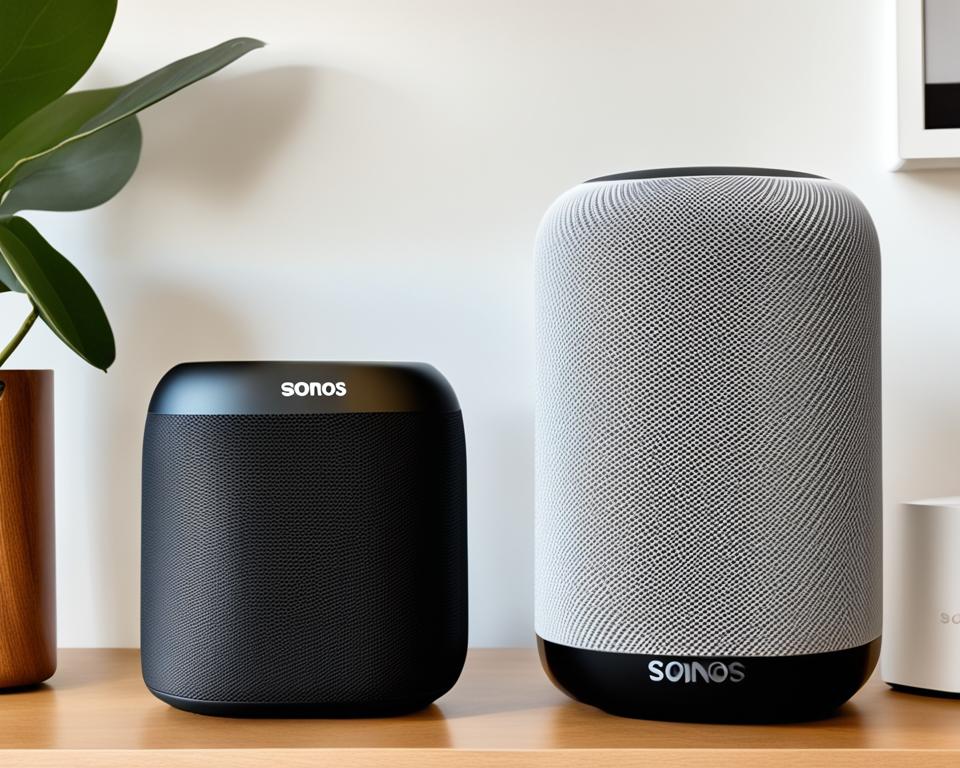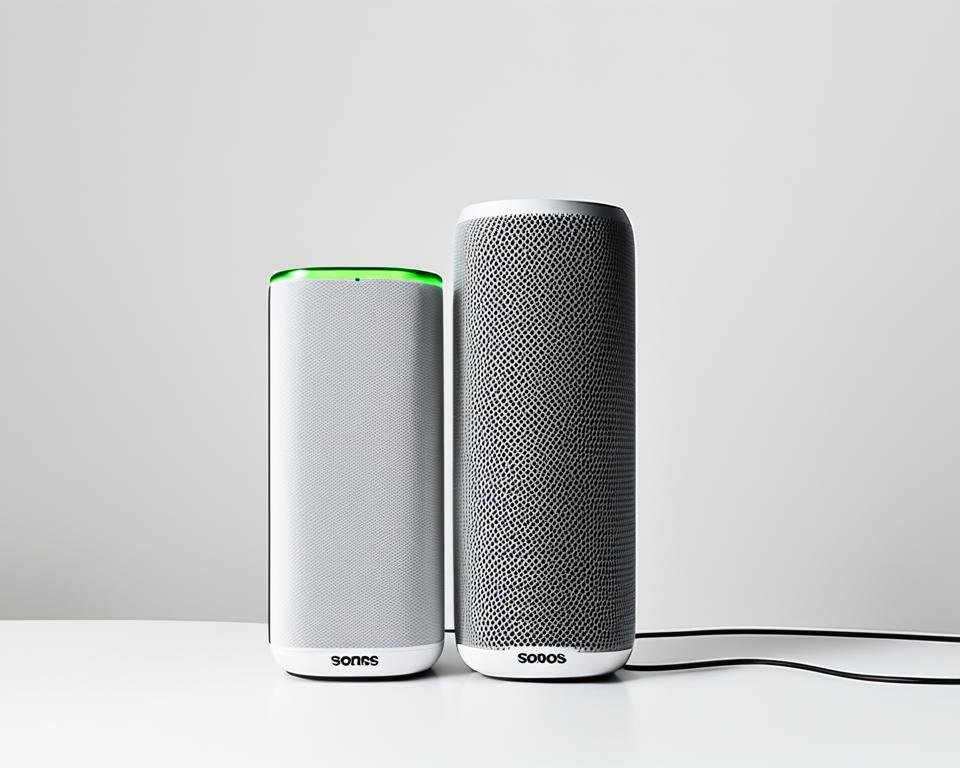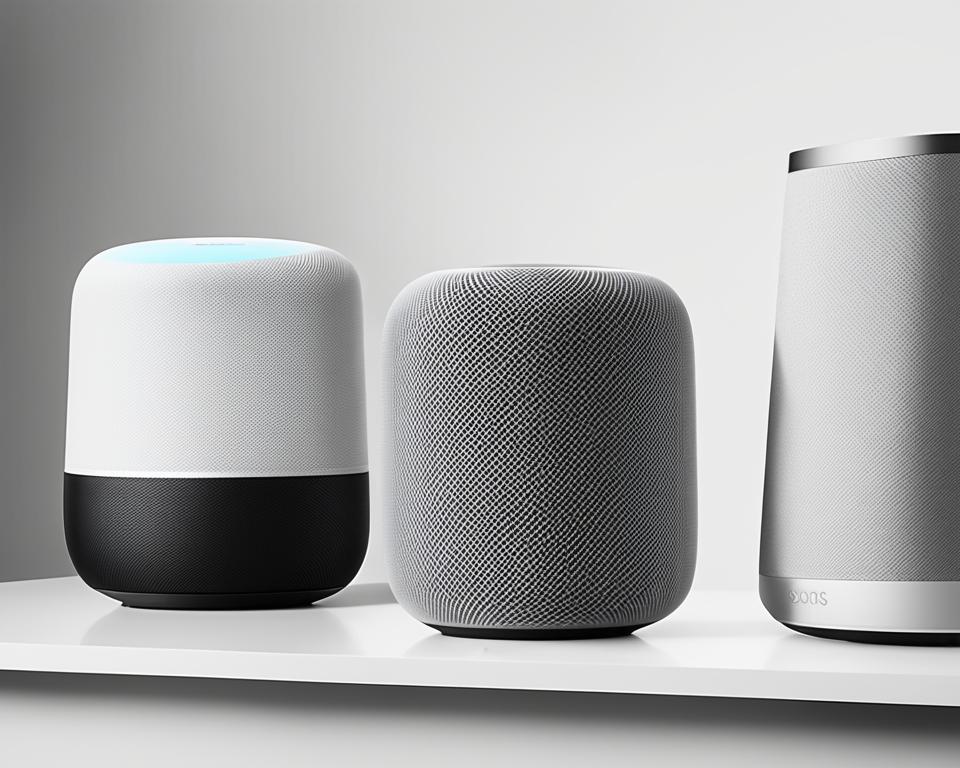Many Sonos users find themselves wondering if it’s possible to pair their Sonos speakers with the Apple HomePod to create an enhanced smart home audio experience. In this article, we will explore the topic and provide you with all the information you need to know about pairing Sonos with Apple HomePod.
So, if you’re eager to integrate these two popular devices and take your home audio to the next level, keep reading!

Understanding the Compatibility
First, it’s important to understand the compatibility between Sonos and Apple HomePod. While Sonos speakers support a wide range of integration options, including AirPlay 2, Apple HomePod does not natively support integration with other smart speaker systems like Sonos. However, there are workarounds and solutions available to achieve the desired integration.
Compatibility Overview:
- Sonos speakers are designed to be versatile and work seamlessly with various smart home devices and platforms.
- Apple HomePod, on the other hand, is primarily meant to be used within Apple’s ecosystem and lacks built-in support for Sonos integration.
Challenges and Workarounds:
Integrating Sonos with Apple HomePod may require additional steps and setups due to their differing compatibility. However, it is still possible to achieve a harmonious integration between these two systems.
The most common workaround is to utilize Apple’s AirPlay 2 feature, which allows you to stream audio from your Apple devices to multiple compatible speakers, including both Sonos and HomePod. By configuring your Sonos speakers and HomePod to work with AirPlay 2, you can achieve a seamless integration and control the audio playback using Siri voice commands.
Comparison Table:
| Feature | Sonos | Apple HomePod |
|---|---|---|
| Smart Home Integration | Extensive compatibility with various smart home platforms and devices. | Limited integration options, primarily focused on Apple’s ecosystem. |
| Speaker Configuration | Flexibility to create multi-room audio setups with different Sonos speakers. | Single-unit speaker primarily designed for individual room use. |
| Voice Control | Supports voice control through smart assistants like Amazon Alexa and Google Assistant. | Utilizes Siri for voice commands and control. |
| Audio Quality | Known for its exceptional sound quality and immersive audio experience. | Delivers impressive audio performance within a compact form factor. |
While Apple HomePod may have some limitations when it comes to integration with Sonos, it still offers a powerful audio experience within the Apple ecosystem. By exploring the compatibility options and utilizing workarounds like AirPlay 2, you can bring together the best of both Sonos and Apple HomePod to create a truly enriching smart home audio environment.
Using AirPlay 2 for Integration
One way to achieve integration between your Sonos speakers and Apple HomePod is by utilizing the powerful AirPlay 2 feature. With AirPlay 2, you can effortlessly stream audio from your Apple devices to multiple compatible speakers, including both Sonos and HomePod. This offers a seamless and convenient solution for creating a harmonious smart home audio system.
To begin the integration process, you will need to configure your Sonos speakers and HomePod to work with AirPlay 2. This can be done by following a few simple steps:
- Ensure that both your Sonos speakers and HomePod are connected to the same Wi-Fi network.
- Enable AirPlay 2 on your Sonos speakers by opening the Sonos app and navigating to the settings menu.
- Add your Sonos speakers to the Home app on your Apple device. This will allow them to be recognized and controlled through AirPlay 2.
- Once your Sonos speakers are successfully added, you can create a group with your HomePod using the Home app. This will enable synchronized audio playback across both systems.
Once the integration is complete, you can now enjoy the convenience of controlling your audio playback using Siri voice commands. Whether you want to play music, adjust the volume, or skip a track, all you need to do is ask Siri and let the seamless integration between Sonos and HomePod work its magic.
Benefits of Sonos and HomePod Integration
The integration of Sonos and HomePod using AirPlay 2 brings along a host of benefits that enhance your smart home audio experience. Some key advantages include:
- The ability to play audio from your Apple devices, such as iPhone or iPad, directly to both Sonos and HomePod speakers simultaneously.
- The flexibility to group Sonos speakers and HomePod together, allowing synchronized playback in multiple rooms of your home.
- Hands-free control of audio playback using Siri voice commands, making it even more convenient to enjoy your favorite music or podcasts.
With the Sonos and HomePod integration using AirPlay 2, you can create a seamless and immersive audio experience that fills your entire home with rich, high-quality sound. Whether you’re hosting a party, relaxing at home, or engaging in a productive work session, this integration offers unparalleled convenience and flexibility.

Configuring the Integration
To configure the integration between Sonos and HomePod, follow these steps:
- Ensure that both your Sonos speakers and HomePod are connected to the same Wi-Fi network.
- Enable AirPlay 2 on your Sonos speakers. This will allow them to receive audio from your Apple devices.
- Add your Sonos speakers to the Home app on your Apple device. Open the Home app, tap the “+” icon, and follow the prompts to add your Sonos speakers.
- Once successfully added, you can group your Sonos speakers and HomePod together. This will create a synced audio experience across all the devices.
Grouping Sonos Speakers and HomePod
To group your Sonos speakers and HomePod:
- Open the Home app on your Apple device.
- Navigate to the “Rooms” tab.
- Select the room where your Sonos speakers and HomePod are located.
- Tap the “+” icon to add a new accessory.
- Choose the Sonos speakers and HomePod you want to group together.
- Save the changes.
Once your Sonos speakers and HomePod are grouped, you can control the playback and volume using the Home app or Siri voice commands.
Example Configuration:
Here is an example of how the configuration should look in the Home app:
| Room | Sonos Speakers | HomePod |
|---|---|---|
| Living Room | Play:1, Playbar | Kitchen HomePod |
Note: The above example is for illustration purposes only. Your actual configuration may vary based on your Sonos speaker models and the number of speakers you have.

With the integration successfully configured, you can now enjoy a seamless audio experience by playing music or other audio content across your Sonos speakers and HomePod.
Enjoying the Enhanced Audio Experience
Now that the integration between Sonos and HomePod is set up, get ready to immerse yourself in an enhanced audio experience in your smart home. With the ability to sync and group Sonos speakers with HomePod, you have the power to play music or any audio content seamlessly across multiple rooms. This seamless synchronization allows you to create a surround sound-like setup, filling your entire home with rich, immersive sound.
Imagine starting your day with your favorite playlist gently playing throughout your bedroom, seamlessly transitioning to the kitchen as you prepare your morning coffee. As you move from room to room, the audio follows you, creating a fluid experience that transforms your home into a concert hall or a private cinema.
But it doesn’t stop there. The integration between Sonos and HomePod also grants you the power of voice control. Utilizing the Siri voice assistant, you can effortlessly control the playback and adjust the volume of the synced speakers with simple voice commands. From the comfort of your couch or anywhere in your home, you can request your favorite songs, adjust the volume, or even skip tracks, all without lifting a finger.
Whether you’re hosting a party or simply enjoying a quiet evening at home, the combined power of Sonos and HomePod provides a synchronized audio experience that enhances every aspect of your daily life. With the ability to seamlessly play music across multiple rooms and the convenience of voice control, you can create the perfect ambiance for any occasion.
Benefits of Sonos and HomePod Integration
The integration of Sonos and HomePod offers numerous benefits, revolutionizing your smart home audio experience:
- Seamless synchronization: With Sonos and HomePod working together, you can effortlessly sync and group speakers, allowing you to enjoy your favorite audio content throughout your entire home.
- Enhanced control: By utilizing Siri voice commands, you gain convenient control over the playback and volume of your synced speakers, making audio control as simple as speaking.
- Versatile audio options: With Sonos and HomePod integration, you have access to a wide range of streaming services and audio sources, providing you with endless options for entertainment.
- Unmatched sound quality: Sonos and HomePod are renowned for their exceptional sound quality, ensuring that every note and beat is reproduced with clarity and precision.
By combining the strengths of Sonos and HomePod, you can elevate your smart home audio experience to new heights. Say goodbye to limitations and hello to a world of immersive audio pleasure.
| Benefit | Description |
|---|---|
| Seamless Synchronization | Enjoy your favorite audio content throughout your entire home, with synced speakers seamlessly transitioning from room to room. |
| Enhanced Control | Take control of your audio experience with Siri voice commands, managing playback and volume effortlessly. |
| Versatile Audio Options | Access a wide range of streaming services and audio sources to suit your personal preferences. |
| Unmatched Sound Quality | Experience the exceptional sound quality of Sonos and HomePod, ensuring every beat resonates with clarity. |
Troubleshooting and FAQs
While the integration process of Sonos and HomePod is relatively straightforward, there may be instances where you encounter issues or have questions. Don’t worry, we’ve got you covered! Here are some common troubleshooting tips and frequently asked questions that can help you resolve any problems that may arise.
Troubleshooting Sonos and HomePod Integration
If you are experiencing troubles with the integration of your Sonos speakers and Apple HomePod, here are a few troubleshooting steps to consider:
- Ensure that both your Sonos speakers and HomePod are connected to the same Wi-Fi network. Connectivity issues arise when devices are on different networks.
- Verify that your Sonos speakers and HomePod are running on their most recent firmware versions. Outdated software can lead to compatibility issues.
- Restart your Sonos speakers and HomePod. Sometimes, a simple reboot can solve connectivity problems.
- Check if AirPlay 2 is enabled on your Sonos speakers and HomePod. Without this feature activated, integrated audio streaming will not function properly.
- If you are still facing issues, consult the user manuals for both Sonos and HomePod or contact their respective customer support for further assistance.
FAQs for Sonos and HomePod Pairing
Here are some frequently asked questions regarding the pairing of Sonos and HomePod:
- Can I pair multiple Sonos speakers with a single HomePod? Yes, you can connect multiple Sonos speakers to a single HomePod using AirPlay 2. This allows for synchronized audio playback across different rooms.
- Can I control the volume of Sonos speakers and HomePod separately when they are paired? Yes, you can adjust the volume of Sonos speakers and HomePod independently when they are connected. Use the Sonos app or Siri voice commands to control each device’s volume.
- Is it possible to use Sonos and HomePod in a stereo pair configuration? No, it is not currently possible to create a stereo pair configuration using Sonos speakers and HomePod. However, you can still achieve synced and multi-room audio playback.
- Can I group Sonos speakers and HomePod with other AirPlay 2-compatible devices? Absolutely! You can create groups that include Sonos speakers, HomePod, and other AirPlay 2-enabled devices like Apple TV. This allows for a seamless audio experience across various devices.
If you have any further questions or need assistance with your Sonos and HomePod integration, feel free to reach out to the respective customer support teams. They will be more than happy to help you get the most out of your smart home audio setup!
Exploring Alternative Integration Options
If you’re unable to achieve the desired integration between Sonos and HomePod, there are alternative options available that can provide similar functionality. Instead of pairing Sonos with HomePod, you can explore other smart speaker systems that are compatible with Sonos. These systems, such as Amazon Echo or Google Nest Audio, offer voice control and multi-room audio capabilities, allowing you to enjoy a seamless audio experience throughout your home.
Another alternative option is to consider alternative voice assistants. While HomePod uses Siri as its voice assistant, other smart speakers like Amazon Echo or Google Nest Audio utilize Alexa and Google Assistant, respectively. These voice assistants offer a wide range of features and compatibility with various smart home devices, including Sonos. By integrating Sonos with a different voice assistant, you can still achieve voice control and create a customized smart home audio setup.
Ultimately, the key is to explore the available alternatives and find the option that best suits your needs and preferences. Whether it’s integrating Sonos with a different smart speaker system or utilizing a different voice assistant, you can still create an immersive audio experience in your smart home without the direct integration of Sonos and HomePod.

